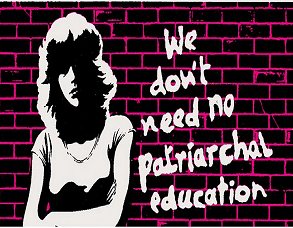
A survey, purportedly to gauge just what the title says, is out there in the Internet ether, and if you’ve never seen a self-fulfilling prophecy, well, this certainly is one.
The “independent research survey conducted by a non-affiliated research team” (which has been available since at least May of 2014) supposedly studies “the systemic oppressions of women in higher education and how it can contribute to chronic stress that may lead to negative effects on ones physical and mental health.”
Jane the Actuary makes note of the Facebook page of a group called “Fight the Tower,” saying it’s just an “incidental link which may or may not be the same people (responsible for the survey).”
But, perhaps I can assist Jane: If you click through the survey without answering any questions, eventually you reach a page where three contact names pop up.
The first name, Caroline Valverde, is listed on Fight the Tower’s “Testimonial” page (as Kieu-Linh Caroline Valverde).
The second, Melody Yee, can be seen answering questions about the survey on this Facebook page, titled “Presumed Incompetent via Fight the Tower.” Presumed Incompetent is the name of a book about “the intersecting roles of race, gender, and class in the working lives of women faculty of color.” According to FTT’s “manifesto,” the organization is “led in part” by the book’s authors.
There were no concrete associations for the last name, Jing Mai; however, she “liked” Fight the Tower’s manifesto Facebook page, and if you follow the link to her personal FB page you’ll see that she is fairly outspoken on numerous related causes.
Speaking of this manifesto (also noted on Fight the Tower’s website), it reads in part
As women of color in academia, we are often presumed incompetent, not because of our teaching, scholarship, or service, but because of the biased presumptions associated with our gender, sex, sexual orientation, color, race, national origin, ethnic group identification, citizenship status, accent, age, disability, religion, marital status, motherhood, and personhood.
We are perceived as easy targets for discrimination and dismissal based on these assumptions, and because our numbers are still kept disproportionately low in academic institutions, many wrongly surmise we are not capable of collective action. We stand today to say we are united in our struggles to fight off the institutional violent attacks against our personhood, work, and well-being, and vow to connect with others to assist and unite in raising our voices and demanding equal rights and justice.
This is what we know.
We know meritocracy in academia is a myth that is promoted by the dominant group to perpetuate a status quo that protects their own inadequacies.
The reality is we are expected to produce beyond the standards set out by and for the institutional establishment. But, even when we exceed those standards and excel, that does not guarantee equitable pay, promotion, tenure, maintenance of tenure, or equality.
We call out the power holders for their lack of real commitment to rigorous scholarship and demand our earned place in the academy beyond token appointments.
We know the academic career pipeline does not exist for us.
Academic institutions create barriers for women of color to prevent our admission to graduate programs, access to tenure-track positions, tenure, administrative power, professional success, and advancement – especially in top tier universities. Those of us that make it through the system are constantly under scrutiny and this makes work progress difficult and every advancement effort a battle.
Wow. Who knew that one of the most progressive institutions extant was so … heteronormatively and oppressively patriarchal?
And, here are some of the Health of Women in Academia survey questions:
- Do you believe that your students and/or peers treat you with respect and as a serious scholar? If not, what are instances of negativity, and why do you believe these individuals behave this way towards you?
- During the tenure process, how much stress did you experience?
- Do you believe that your identity (ie. your racial background, gender, class, sexuality, etc) influenced the final decision of whether or not you were given tenure?
- Do you believe there are obstacles that uniquely affect you as a woman of color during the tenure process?
- What do you think these obstacles are?
- Do you believe that the stress you experience has/had an impact on your health?
- Did you/do you have a mentor(s) of the same ethnic background as you?
- Do you feel safe at your academic environment?
- Do you feel like you are under chronic stress from the academic environment? If yes, please explain why.
- Do you believe that you are treated unfairly by your peers or superiors because of your perceived identity?
- How well do you believe that supervisors and/or co-workers respect and listen to your contributions in academia?
- What do you believe causes or has caused chronic stress for you in general?
- Do you believe your perceived identity factors into discriminatory practices, affecting your career advancement? “Perceived identity” refers to one’s identification with a certain cultural background, race, gender, social class, etc.
- Do you feel that your race and/or sex prevents or severely hinders your upward mobility in academia?
- How much of your identity do you feel you have to suppress to be able to assimilate into the academic culture?
“Do you feel safe …” Really??
The aforementioned Jane the Actuary aptly states, “A self-selected survey, destined to be completed only by those with grievances, in which the respondents are asked explicitly to make the connection that their systematic oppression harms their health cannot make any contribution to knowledge on the subject.”
She adds, “If these women think they can draw any conclusions from their results, then they are justly ‘presumed incompetent’ despite the complaint in their manifesto that this is an unjust assumption.”
Indeed. And then the vicious circle begins: (Legitimate) questions about one’s competence are due to (all taken from the manifesto) “little civility in academia,” “constant macro- and micro-aggressions,” and “people of color (who) subjugate their own (because they’re) co-opted tokens and opportunists …”
h/t to Instapundit.
Dave Huber is an assistant editor of The College Fix. (@ColossusRhodey)
Like The College Fix on Facebook / Follow us on Twitter
IMAGE: Christopher Dombres/Flickr







Please join the conversation about our stories on Facebook, Twitter, Instagram, Reddit, MeWe, Rumble, Gab, Minds and Gettr.